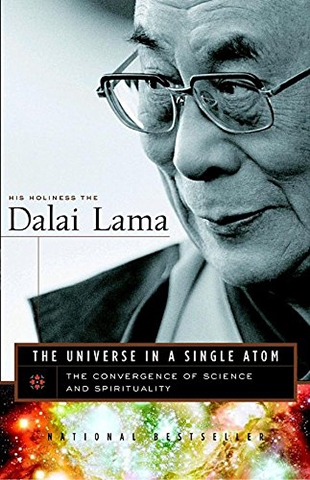"Today's challenges are so great — and the dangers of the misuse of technology so global, entailing a potential catastrophe for all humankind — that I feel we need a moral compass we can use collectively without getting bogged down in doctrinal differences. One key factor that we need is a holistic and integrated outlook at the level of human society that recognizes the fundamentally interconnected nature of all living beings and their environment. Such a moral compass must entail preserving our human sensitivity and will depend on us constantly bearing in mind our fundamental human values. We must be willing to be revolted when science — or for that matter any human activity — crosses the line of human decency, and we must fight to retain the sensitivity that is otherwise so easily eroded.
"How can we find this moral compass? We must begin by putting in faith the basic goodness of human nature, and we need to anchor this faith in some fundamental and universal ethical principles. These include a recognition of the preciousness of life, an understanding of the need for balance in nature and the employment of this need as a gauge for the direction of our thought and action, and — above all — the need to ensure that we hold compassion as the key motivation for all our endeavors and that it is combined with a clear awareness of the wider perspective, including long-term consequences. Many will agree with me that these ethical values transcend the dichotomy of religious believers and nonbelievers, and are crucial for the welfare of all humankind. Because of the profoundly interconnected reality of today's world, we need to relate to the challenges we face as a single human family rather than as members of specific nationalities, ethnicities, or religions. In other words, a necessary principle is a spirit of oneness of the entire human species. Some might object that this is unrealistic. But what other option do we have?
"I firmly believe it is possible. The fact that, despite our living for more than half a century in the nuclear age, we have not yet annihilated ourselves is what gives me great hope. It is no more coincidence that, if we reflect deeply, we find these ethical principles at the heart of all major spiritual traditions.
"In developing an ethical strategy with respect to the new genetics, it is vitally important to frame our reflection within the widest possible context. We must first of all remember how new this field is and how new are the possibilities it offers, and to contemplate how little we understand what we know. We have now sequenced the whole of the human genome, but it may take decades for us fully to understand the functions of all the individual genes and their interrelationships, let alone the effects of their interaction with the environment. Too much of our current focus is on the feasibility of a particular technique, its immediate or short-term results and side effects, and what effect it may have on individual liberty. These are all valid concerns, but they are not sufficient. Their purview is too narrow, given that the very conception of human nature is at stake. Because of the far-reaching scope of these innovations, we need to examine all areas of human existence where genetic technology may have lasting implications. The fate of the human species, perhaps of all life on this planet, is in our hands. In the face of the great unknown, would it not be better to err on the side of caution than to transform the course of human evolution in an irreversibly damaging direction?
"In a nutshell, our ethical response must involve the following key factors. First, we have to check our motivation and ensure that its foundation is compassion. Second, we must relate to any problem before us while taking into account the widest possible perspective, which includes not only situating the issue within the picture of wider human enterprise but also taking due regard of both short-term and long-term consequences. Third, when we apply our reason in addressing a problem, we have to be vigilant in ensuring that we remain honest, self-aware, and unbiased; the danger otherwise is that we may fall victim to self-delusion. Fourth, in the face of any real ethical challenge, we must respond in a spirit of humility, recognizing not only the limits of our knowledge (both collective and personal) but also our vulnerability to being misguided in the context of such a rapidly changing reality. Finally, we must all-scientists and society at large-strive to ensure that whatever new course of action we take, we keep in mind the primary goal of the well-being of humanity as a whole and the planet we inhabit.
"The earth is our only home. As far as current scientific knowledge is concerned, this may be the only planet that can support life. One of the most powerful visions I have experienced was the first photograph of the earth from outer space. The image of a blue planet floating in deep space, glowing like the full moon on a clear night, brought home powerfully to me the recognition that we are indeed all members of a single family sharing one little house. I was flooded with the feeling of how ridiculous are the various disagreements and squabbles within the human family. I saw how futile it is to cling so tenaciously to the differences that divide us. From this perspective one feels the fragility, the vulnerability of our planet and its limited occupation of a small orbit sandwiched between Venus and Mars in the vast infinity of space. If we do not look after this home, what else are we charged to do on this earth?"
